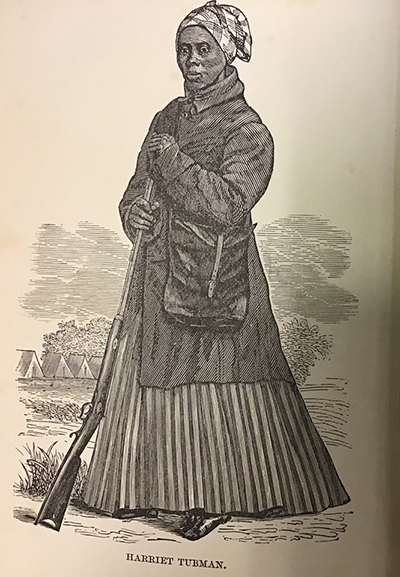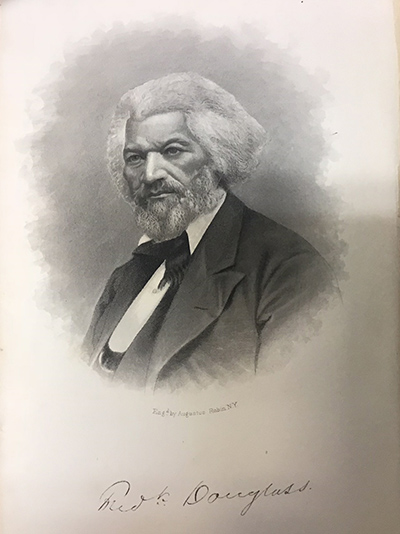Collection Description

Engraved frontispiece portrait of Harriet Tubman from: Sarah H. Bradford. Scenes in the Life of Harriet Tubman. W.J. Moses, printer, Auburn, N.Y., 1869.
Cornell's Anti-Slavery and Civil War Collections
Cornell University Library began collecting materials on abolitionists, the anti-slavery movement and the American Civil War during the 1860s, thanks to Cornell's first President, Andrew Dickson White. Even before his arrival at Cornell, as a history professor White used his lectures at the University of Michigan to respond to the issues of the War by pointing out to his students as many examples as he could of societies that valued the rights of free men, and inviting abolitionists such as Wendell Phillips and Frederick Douglass to lecture to students. He also developed his own collection of documents, pamphlets, and letters on the progress of the Civil War. He saved the letters his students sent him from the battlefield, and gathered maps, newspapers, prints, clippings, and other ephemera. When White's personal library was transferred to Cornell in 1891, his Civil War collection contained hundreds of bound volumes of pamphlets, documenting all aspects of the War—social, political, military, and religious.

Engraved portrait of Fredrick Douglass from: Life and Times of Frederick Douglass: His Early Life as a Slave, His Escape from Bondage, and His Complete History to the Present Time, written by himself with an introduction by George L. Ruffin. Park Pub. Co., 1881.
The May Anti-Slavery Collection
In 1870, just five years after Cornell’s founding, White was instrumental in bringing an extensive collection of slavery and abolitionist materials gathered by his close friend, Reverend Samuel Joseph May, to the Cornell Library. Numbering over 10,000 titles, May's pamphlets document the anti-slavery struggle at the local, regional, and national levels. Much of the May Anti-Slavery Collection was considered ephemeral or fugitive, and many of these pamphlets remain scarce today. Sermons, position papers, offprints, local Anti-Slavery Society newsletters, speeches, poetry anthologies, freedmen's testimonies, broadsides, and Anti-Slavery Fair keepsakes all document the social and political implications of the abolitionist movement and the fight for equality and human rights.
News of the arrival of Samuel May's collection at Cornell spread, and in 1874 the abolitionists William Lloyd Garrison, Wendell Phillips, and Gerrit Smith, wrote, signed, and circulated an appeal to their friends and supporters in America and Great Britain, urging that it was of "great importance that the literature of the Anti-Slavery movement...be preserved and handed down, that the purposes and the spirit, the methods and the aims of the Abolitionists should be clearly known and understood by future generations." The effort was successful, bringing in further scarce and original manuscripts and publications to Ithaca, allowing the Cornell Library to develop an Anti-Slavery collection that is unique for its depth and coverage at a time well before other research libraries began collecting the subject.
The May Anti-Slavery Collection Pamphlets Online
The pamphlets in Samuel J. May's Anti-Slavery library have been digitized and their texts are searchable online. The collection was digitized in 1999 with $331,000 in funding provided by a grant from the "Save America's Treasures" initiative, a public-private partnership between the White House Millennium Council and National Trust for Historic Preservation, administered by the National Endowment for the Humanities. It was one of 62 projects funded nationwide in 1999, and one of only two awards made to libraries.
Search/browse the pamphlets collection
The May Anti-Slavery Manuscripts Online
The May Anti-Slavery Collection also includes manuscripts and letters, featuring correspondence among several American abolitionists. The manuscripts in the May Collection include many letters to Samuel Joseph May, his diaries from 1859-1861 and 1865-1870, and correspondence among members of May's family and the family of James Miller McKim. The collection also preserves some correspondence with Daniel Willard Fiske and George William Harris concerning the building of the May Anti-Slavery Collection at Cornell. Other correspondents include Lyman Abbott, John Brown, Henry Grafton Chapman, Maria Weston Chapman, David Lee Child, Lydia Maria Child, Daniel Willard Fiske, Thomas, Garrett, William Lloyd Garrison, D.C. Haynes, George William Harris, H.B. Holmes, Oliver Otis Howard, Oliver Johnson, Joseph May, Lucretia F. May, Samuel May Jr., Samuel Joseph May, James Miller McKim, William Forster Mitchell, Lucretia Coffin Mott, Wendell Phillips, William Still, Reuben Tomlinson, George Cabot Ward, and Theodore G. Wright.